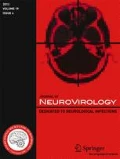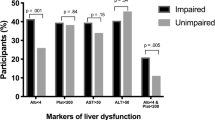Abstract
Treatment of hepatitis C virus (HCV) with pegylated interferon and ribavirin (IFN/RBV) can be associated with neuropsychiatric side effects, which may necessitate dose reductions or treatment discontinuation. This study aimed to characterize the time course and predictors of cognitive and affective/mood symptoms after IFN/RBV treatment initiation. Forty individuals enrolled in a longitudinal project underwent comprehensive cognitive, medical, and psychiatric assessment at baseline and 10 weeks, 6 months, 12 months, and 18 months after treatment initiation. Analyses were conducted to determine the prevalence of neurocognitive impairment over time; explicate the relationship between neurocognitive impairment, neuropsychiatric symptoms, and liver disease at each time point; and identify predictors of neurocognitive decline as well as cognitive effects of viral clearance. By 10 weeks after initiating IFN/RBV, the prevalence of neurocognitive impairment rose from 22.5 to 47.4 % (p < 0.05). Infection with genotype 1 and premorbid depression were associated with more severe declines (p < 0.05). After 18 months, 42.5 % remained neurocognitively impaired, independent of viral clearance, severity of liver disease, and current depressive symptoms. Undetectable viral load was not associated with improvement 18 months after initiating treatment (p > 0.10). Results of the current study indicate that IFN/RBV treatment-emergent neurocognitive declines are significant, prevalent, and may persist long after treatment cessation. Clinicians should monitor cognition throughout the course of treatment for HCV, noting that early declines may indicate individuals at elevated risk for persistent neurocognitive impairment. Longer-term studies are needed to determine whether lasting declines may remit over longer intervals or with newer direct acting agents.



Similar content being viewed by others
Abbreviations
- HCV:
-
Hepatitis C virus
- IFN/RBV:
-
Interferon and ribavirin
- CNS:
-
Central nervous system
- NIDA:
-
National Institute on Drug Abuse
- UCSD:
-
University of California San Diego
- IgG:
-
Immunoglobulin G
- ELISA:
-
Enzyme-linked immunosorbent assay
- HIV:
-
Human immunodeficiency virus
- MDD:
-
Major depressive disorder
- GDS:
-
Global deficit score
- SD:
-
Standard deviation
- BDI-II:
-
Beck Depression Inventory-II
- APRI:
-
Aspartate aminotransferase to platelet ratio index
References
American Psychiatric Association (2000) Diagnostic and statistical manual of mental disorders, 4th edn. Author, Washington, DC.
Asnis GM, De La Garza R (2006) Interferon-induced depression in chronic hepatitis C: a review of its prevalence, risk factors, biology, and treatment approaches. J Clin Gastroenterol 40:322–335
Beck AT (1987) The beck depression inventory. Psychological Corporation, San Antonio
Carey CL, Woods SP, Gonzalez R, Conover E, Marcotte TD, Grant I, Heaton RK (2004) Predictive validity of global deficit scores in detecting neuropsychological impairment in HIV infection. J Clin Exp Neuropsychol 26:307–319
Córdoba J, Flavià M, Jacas C, Sauleda S, Esteban JI, Vargas V, Esteban R, Guardia J (2003) Quality of life and cognitive function in hepatitis C at different stages of liver disease. J Hepatol 39:231–238
Cysique LA, Vaida F, Letendre S, Gibson S, Cherner M, Woods SP, McCutchan JA, Heaton RK, Ellis RJ (2009) Dynamics of cognitive change in impaired HIV-positive patients initiating antiretroviral therapy. Neurology 73:342–348. doi:10.1212/WNL.0b013e3181ab2b3b
de Knegt RJ, Bezemer G, Van Gool AR, Drenth JP, Hansen BE, Droogleever Fortuyn HA, Weegink CJ, Hengeveld MW, Janssen HL (2011) Randomised clinical trial: escitalopram for the prevention of psychiatric adverse events during treatment with peginterferon‐alfa‐2a and ribavirin for chronic hepatitis C. Aliment Pharmacol Ther 34:1306–1317. doi:10.1111/j.1365-2036.2011.04867
Dusheiko G (1997) Side effects of alpha interferon in chronic hepatitis C. Hepatology 26:S112S–S121S
Fontana RJ (2000) Neuropsychiatric toxicity of antiviral treatment in chronic hepatitis C. Dig Dis 18:107–116
Forton D, Karayiannis P (2006) Established and emerging therapies for the treatment of viral hepatitis. Dig Dis 24:160–173
Forton DM, Allsop JM, Cox IJ, Hamilton G, Wesnes K, Thomas HC, Taylor-Robinson SD (2005) A review of cognitive impairment and cerebral metabolite abnormalities in patients with hepatitis C infection. AIDS 19:S53–S63
Gane E, Stedman C, Hyland R, Sorensen R, Symonds W, Hindes R, Berrey M (2012) Once daily GS-7977 plus ribavirin in HCV genotypes 1–3: the ELECTRON trial. Hepatology 56:306A–307A
Heaton RK, Kirson D, Velin RA, Grant I, The HNRC Group (1994) The utility of clinical ratings for detecting cognitive change in HIV infection. In: Grant I, Martin A (eds) Neuropsychology of HIV infection. Oxford University Press, New York, pp 188–206
Hilsabeck RC, Perry W, Hassanein TI (2002) Neuropsychological impairment in patients with chronic hepatitis C. Hepatology 35:440–446
Hilsabeck RC, Hassanein TI, Ziegler EA, Carlson MD, Perry W (2005) Effect of interferon-[alpha] on cognitive functioning in patients with chronic hepatitis C. J Int Neuropsychol Soc 11:16–22
Kraus MR, Schäfer A, Faller H, Csef H, Scheurlen M (2002) Paroxetine for the treatment of interferon‐α‐induced depression in chronic hepatitis C. Aliment Pharmacol Ther 16:1091–1099
Laskus T, Radkowski M, Adair DM, Wilkinson J, Scheck AC, Rakela J (2005) Emerging evidence of hepatitis C virus neuroinvasion. AIDS 19:S140–S144
McAndrews MP, Farcnik K, Carlen P, Damyanovich A, Mrkonjic M, Jones S, Heathcote EJ (2005) Prevalence and significance of neurocognitive dysfunction in hepatitis C in the absence of correlated risk factors. Hepatology 41:801–808
McNutt MD, Liu S, Manatunga A, Royster EB, Raison CL, Woolwine BJ, Demetrashvili MF, Miller AH, Musselman DL (2012) Neurobehavioral effects of Interferon-alpha in patients with Hepatitis-C: symptom dimensions and responsiveness to paroxetine. Neuropsychopharmacology 37:1444–1454. doi:10.1038/npp.2011.330
Murray J, Fishman SL, Ryan E, Eng FJ, Walewski JL, Branch AD, Morgello S (2008) Clinicopathologic correlates of hepatitis C virus in brain: a pilot study. J Neurovirol 14:17–27. doi:10.1080/13550280701708427
Neri S, Bertino G, Petralia A, Giancarl C, Rizzotto A, Calvagno GS et al (2010) A Multidisciplinary therapeutic approach for reducing the risk of psychiatric side effects in patients with chronic hepatitis C treated with pegylated Interferon and Ribavirin. J Clin Gastroenterol 44:210–217. doi:10.1097/MCG.0b013e3181d88af5
Pattullo V, McAndrews MP, Damyanovich A, Heathcote EJ (2011) Influence of hepatitis C virus on neurocognitive function in patients free from other risk factors: validation from therapeutic outcomes. Liver Int 31:1028–1038. doi:10.1111/j.1478-3231.2011.02549
Raison CL, Borisov AS, Majer M, Drake DF, Pagnoni G, Woolwine BJ, Vogt GL, Massung B, Miller AH (2009) Activation of central nervous system inflammatory pathways by interferon-alpha: relationship to monoamines and depression. Biol Psychiatry 65:296–303. doi:10.1016/j.biopsych.2008.08.010
Reichenberg A, Gorman JM, Dieterich DT (2005) Interferon-induced depression and cognitive impairment in hepatitis C virus patients: a 72 week prospective study. AIDS 19:S174–S178
Russo MA, Fried MW (2003) Side effects of antiviral therapy for hepatitis C. Gastroenterology 124:1711–1719
Schaefer M, Engelbrechta MA, Gut O, Fiebich BL, Bauer J, Schmidt F, Grunze H, Lieb K (2002) Interferon alpha (IFNα) and psychiatric syndromes: a review. Prog Neuro-Psychopharmacol Biol Psychiatry 26:731–746
Schaefer M, Capuron L, Friebe A, Diez-Quevedo C, Robaeys G, Neri S, Foster GR, Kautz A, Forton D, Pariante CM (2012) Hepatitis C infection, antiviral treatment and mental health: a European Expert Consensus Statement. J Hepatol 57:1379–1390. doi:10.1016/j.jhep.2012.07.037
Schmidt F, Janssen G, Martin G, Lorenzs R, Loeschkes K, Soyka M, Folwaczny C, Schaefer M (2009) Factors influencing long-term changes in mental health after interferon-alpha treatment of chronic hepatitis C. Aliment Pharmacol Ther 30:1049–1059. doi:10.1111/j.1365-2036.2009.04123
Sene D, Limal N, Cacoub P (2004) Hepatitis C virus-associated extrahepatic manifestations: a review. Metab Brain Dis 19:357–381
Senzolo M, Schiff S, D’Aloiso CM, Crivellin C, Cholongitas E, Burra P, Montagnese S (2011) Neuropsychological alterations in hepatitis C infection: the role of inflammation. World J Gastroenterol 17:3369. doi:10.3748/wjg.v17.i29.3369
Thein HH, Maruff P, Krahn MD, Kaldor JM, Koorey DJ, Brew BJ, Dore GJ (2007) Improved cognitive function as a consequence of hepatitis C virus treatment. HIV Med 8:520–528
Valentine AD, Meyers CA (2005) Neurobehavioral effects of interferon therapy. Curr Psychiatr Rep 7:391–395
Vargas HE, Laskus T, Radkowski M, Wilkinson J, Balan V, Douglas DD, Harrison ME, Mulligan DC, Olden K, Adair D, Rakela J (2002) Detection of hepatitis C virus sequences in brain tissue obtained in recurrent hepatitis C after liver transplantation. Liver Transpl 8:1014–1019
Weissenborn K, Krause J, Bokemeyer M, Hecker H, Schüler A, Ennen JC, Ahl B, Manns MP, Boker KW (2004) Hepatitis C virus infection affects the brain—evidence from psychometric studies and magnetic resonance spectroscopy. J Hepatol 41:845–851
Wilkinson GS, Robertson GJ (2006) Wide range achievement test-4 (WRAT-4) Lutz. Psychological Assessment Resources Inc, FL
Wilkinson J, Radkowski M, Laskus T (2009) Hepatitis C virus neuroinvasion: identification of infected cells. J Virol 83:1312–1319. doi:10.1128/JVI.01890-08
World Health Organization (1998) Composite international diagnostic interview (CIDI, version 2.1). World Health Organization, Geneva
Zeuzem S, Buggisch P, Agarwal K, Marcellin P, Sereni D, Klinker H, Moreno C, Zarski JP, Horsmans Y, Mo H, Aterburn S, Knox S, Oldach D, McHutchison JG, Manns MP, Foster GR (2012) The protease inhibitor, GS-9256, and non-nucleoside polymerase inhibitor tegobuvir alone, with ribavirin, or pegylated interferon plus ribavirin in hepatitis C. Hepatology 55:749–758
Acknowledgments
The Translational Methamphetamine AIDS Research Center (TMARC) is supported by Center award P50DA026306 from the National Institute on Drug Abuse (NIDA) and is affiliated with the University of California, San Diego (UCSD) and the Sanford-Burnham Medical Research Institute (SBMRI). The TMARC comprised the following: Director— Igor Grant, M.D.; Co-Directors —Ronald J. Ellis, M.D., Ph.D., Cristian L. Achim, M.D., Ph.D., and Scott L. Letendre, M.D.; Center Manager—Steven Paul Woods, Psy.D.; Assistant Center Manager—Aaron M. Carr, B.A.; Clinical Assessment and Laboratory (CAL) Core: Scott L. Letendre, M.D. (Core Director), Ronald J. Ellis, M.D., Ph.D., Rachel Schrier, Ph.D.; Neuropsychiatric (NP) Core: Robert K. Heaton, Ph.D. (Core Director), J. Hampton Atkinson, M.D., Mariana Cherner, Ph.D., Thomas D. Marcotte, Ph.D., Erin E. Morgan, Ph.D.; Neuroimaging (NI) Core: Gregory Brown, Ph.D. (Core Director), Terry Jernigan, Ph.D., Anders Dale, Ph.D., Thomas Liu, Ph.D., Miriam Scadeng, Ph.D., Christine Fennema-Notestine, Ph.D., Sarah L. Archibald, M.A.; Neurosciences and Animal Models (NAM) Core: Cristian L. Achim, M.D., Ph.D. (Core Director), Eliezer Masliah, M.D., Stuart Lipton, M.D., Ph.D.; Administrative Coordinating Core (ACC)—Data Management and Information Systems (DMIS) Unit: Anthony C. Gamst, Ph.D. (Unit Leader), Clint Cushman (Unit Manager); ACC—Statistics Unit: Ian Abramson, Ph.D. (Unit Leader), Florin Vaida, Ph.D., Reena Deutsch, Ph.D., Anya Umlauf, M.S.; ACC—Participant Unit: J. Hampton Atkinson, M.D. (Unit Leader), Jennifer Marquie-Beck, M.P.H. (Unit Manager); Project 1: Arpi Minassian, Ph.D. (Project Director), William Perry, Ph.D., Mark Geyer, Ph.D., Brook Henry, Ph.D.; Project 2: Amanda B. Grethe, Ph.D. (Project Director), Martin Paulus, M.D., Ronald J. Ellis, M.D., Ph.D.; Project 3: Sheldon Morris, M.D., M.P.H. (Project Director), David M. Smith, M.D., M.A.S., Igor Grant, M.D.; Project 4: Svetlana Semenova, Ph.D. (Project Director), Athina Markou, Ph.D., James Kesby, Ph.D.; Project 5: Marcus Kaul, Ph.D. (Project Director). The views expressed in this article are those of the authors and do not reflect the official policy or position of the United States Government. We have no commercial affiliations or consultancies which might be construed as conflicts of interest. Financial support: NIH (P50-DA026306), P01 DA12065, P30-MH062512.
Author information
Authors and Affiliations
Consortia
Corresponding author
Rights and permissions
About this article
Cite this article
Cattie, J.E., Letendre, S.L., Woods, S.P. et al. Persistent neurocognitive decline in a clinic sample of hepatitis C virus-infected persons receiving interferon and ribavirin treatment. J. Neurovirol. 20, 561–570 (2014). https://doi.org/10.1007/s13365-014-0265-3
Received:
Revised:
Accepted:
Published:
Issue Date:
DOI: https://doi.org/10.1007/s13365-014-0265-3




